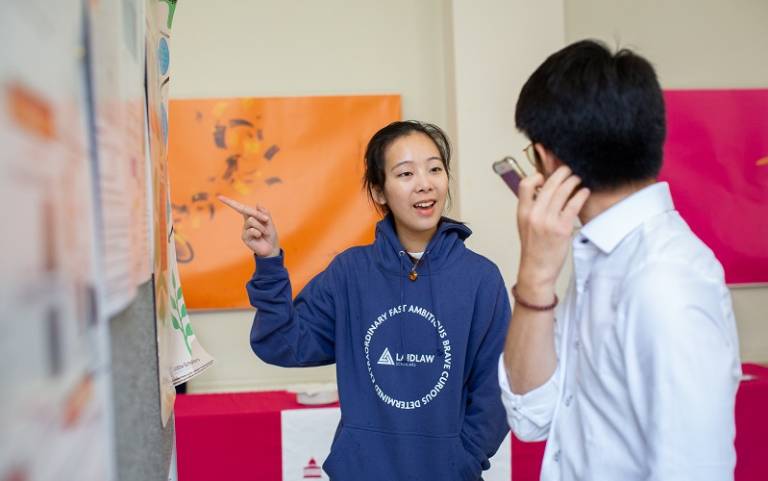Laidlaw Research and Leadership Programme 2020: scholars chosen
12 March 2020
This year’s cohort for UCL's Laidlaw Research and Leadership Programme has been announced

Laidlaw Scholarships are awarded to undergraduate first year students through a competitive process where applicants submit a proposal to undertake their own research project, or request to work on an existing project with researchers from UCL departments.
This year, 87 first-year undergraduates competed for 24 places on UCL's branch of the prestigious programme, which now runs at a number of overseas and UK universities including St. Andrew's and Durham.
It’s a brilliant opportunity for students to get involved in world leading research at an early stage of their academic career, and learn the skills that will make them into future leaders.
UCL departments that offer opportunities for Laidlaw Scholars to join their research projects also benefit, because they get a fully funded and enthusiastic junior researcher, who is driven to make a positive contribution.
“A UCL education offers students the opportunity to carry out their own research, and the Laidlaw Research and Leadership Programme is a great example of this, enabling first year undergraduate students to contribute to our world-leading research output across all the disciplines. The programme, now in its third year has been extremely successful, providing a challenging, rewarding experience for the scholars and excellent contributions to projects for research supervisors. Dr Ruth Siddall, Academic Director of the Laidlaw Programme.
Competitive application process
Once again this year there was a large number of high quality applications so the judging panel had a difficult challenge.
This year the selection process included the new requirement for the applicant to submit a 90 second video outlining their motivations for applying. This was considered alongside the application form, feedback from project supervisors, and an academic reference.
The aim of the new requirement was to ensure that the selected candidates had a strong interest in both the leadership and the research elements of the programme.
The final group of 18 women and 6 men study a varied range of subjects including Pharmacy, History, Natural Sciences, Medicine, Biochemical Engineering and Experimental Linguistics, and are drawn from seven of UCL’s faculties:
- Arts and humanities
- Brain Sciences
- Engineering sciences
- Life sciences
- Mathematical and physical sciences
- Medical Sciences
- Social and historical sciences
The 2020 scholars
See below for the full list of this year's Laidlaw Scholars.
Arts and humanities
- Philippine Coutau, Arts and Sciences BASc
Brain Sciences
- Giulia Li Calzi, BSc Experimental LInguistics
Engineering sciences
- Monica Li, BSc Electronic and Electrical Engineering
- Sebastian Rudden, BEng Biochemical Engineering
Life sciences
- Giorgio Meanti, BSc Biological Sciences
- Hyun-a Cho, MPharm Pharmacy
- Nicole Rudi, BSc Biochemistry
Mathematical and physical sciences
- Inaki Iriarte, BA Geography (International)
- Joshua Choo Zhou, BSc Economics and Statistics
- Laura Sanchez Perez, BSc Mathematics and Physics
- Nanami Tsuchiyama, BA Geography with Quantitative Methods
- Ru Jin Lim, BSc Statistics, Economics and Finance
- Sasha Kroon, Natural Sciences MSci
Medical Sciences
- Ameerah Parvez, Bachelor of Medicine and Surgery (MBBS)
Social and historical sciences
- Chaima Akroum, BA Politics, Sociology and East European Studies
- Christian Filt, BSc Philosophy, Politics and Economics
- Ciara O' Malley, BSc Economics
- Fareeha Masood, BA History
- Khushi Kakrania, BSc Economics
- Konstantin Shmarko, BSc Economics
- Natalie Lam, BA History
- Prisha Bhandari, BA History, Politics and Economics
- Salwa Mansuri, BSc Politics and International Relations
- YiBin Liu, BSc Economics
What happens next
The scholars will immediately get stuck into leadership training activities during the 2020 summer holidays; they will take part in the Global Citizenship Programme and a undertake a fully funded bespoke research project under the guidance of UCL academics over a six-week period.
Research projects
The research that the scholars will be doing this year includes, for example:
- Mental Models and Comparative Survey Research
- Previously unstudied Latin poetry in early modern England
- The IOE Teaching Series: Best Practices for Teaching in Higher Education
- The World Academy for the Future of Women Evaluation Project
- Brain injuries acquired during the neonatal period: characterising cortical electrical activity during the recovery period
- Out with the old, in with the new? Assessing patterns of political representation at times of crises
- Structure and reforms of foreign language education in Europe
- Understanding what employers are looking for from university graduates
- International Law and Transnational Marriage in the Nineteenth Century
- Childhood trauma and psychosis
- A study of the multiple ionisation of <a molecule of interest> and an investigation of the properties of the resulting multiply charged ions
- Uncovering the history of the UCL Economics Department (1945-1970)
- Whose ancient Middle Eastern heritage? A demographic study of Oracc's users worldwide
- Regulating Artificial Intelligence in Europe: Challenges and Opportunities
- A Literature Review on the Determinants of Student Satisfaction in the UK Higher Education
- Blockchain economics and financial development: data and descriptive analysis
- How good is your degree? A conversation between students, academics and employersPay and Display: What determines the price of a painting?
Congratulations to this year’s scholars!
 Close
Close

